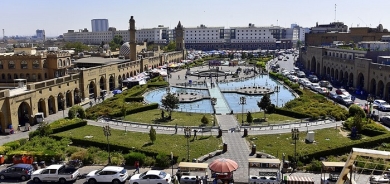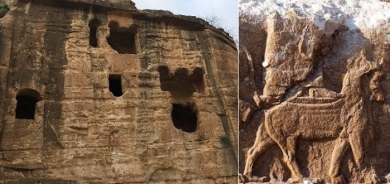Arab foreign ministers to meet in Cairo over escalating Syria violence

The Syrian National Council (SNC) said Arab recognition of the opposition umbrella group was imminent after Syrian authorities moved against protest flashpoints and a general was gunned down in Damascus on Saturday.
In Aleppo, tensions escalated as President Bashar al-Assad’s forces stepped up security after twin car bombs killed 28 people and wounded 235 in Syria’s second city on Friday, activists said.
Forty-five people were killed across the country on Saturday, mostly civilians, said Rami Abdel Rahman of the Britain-based Syrian Observatory for Human Rights.
Tank shelling killed 14 civilians in Homs, most of them in the rebel stronghold neighborhood of Baba Amr, Abdel Rahman told AFP. Dozens were wounded.
Assad’s forces have waged a brutal week-long onslaught on the central protest city of Homs that has killed at least 500 people since February 4, Abdel Rahman said.
Homs activist Hadi Abdullah accused policemen and soldiers of pillaging the Inshaat neighborhood. “They are stealing computers, television sets... and even blankets.”
Security forces also advanced into Zabadani, another main center of resistance near Damascus, said Abdel Rahman, adding that three civilians were killed there.
A general was shot dead outside his Damascus home, state media said. If confirmed, this would be one of the most brazen attacks on the top brass in the capital since the uprising erupted in March last year.
“An armed terrorist group this morning assassinated brigadier general and doctor Issa al-Khawli, the director of Hamish hospital, outside his home in the district of Ruknaddin,” SANA state news agency said.
A YouTube video posted on the Internet showed Syrian tanks bearing huge portraits of Assad firing on a road in Douma, a Damascus suburb which has been plagued by months of violence.
In another video, protesters are seen marching in the Damascus district of al-Aassali carrying banners which said: “We will only kneel before God,” and “Long live Syria, down with Bashar al-Assad.”
Violence in Lebanon
In Lebanon, a 17-year-old girl was among three people killed and 23 were wounded in clashes between Sunni Muslims hostile to Syria’s regime and Alawites who support it, a security official said.
Ten of the wounded were Lebanese soldiers, including a sergeant in critical condition.
The rival factions in Tripoli, in northern Lebanon, fired guns and rocket-propelled grenades at each other in the bloodiest clashes since June, when six people died in the wake of demonstrations against Syria’s government.
In recent years Tripoli has been rocked by intense clashes between members of its Sunni-majority community and Alawites -- the community from which hails the Syrian president.
Syrian state media, meanwhile, blamed “terrorists” for Friday’s double car bomb attacks on security posts in Aleppo.
The rebel Free Syrian Army accused the “criminal” regime of launching the attacks “to steer attention away from what it is doing in Homs, Zabadani and elsewhere.”
A report citing unnamed U.S. officials said the bombings were likely to have been carried out by the Iraqi branch of al-Qaeda, along with attacks on Damascus in December and January.
McClatchy Newspapers said the incidents appeared to verify Assad’s charges of al-Qaeda involvement in the uprising against his 11-year rule.
And Iraq’s deputy interior minister said on Saturday that jihadists are moving from Iraq to Syria, as are weapons being sent to Assad’s opponents.
“We have intelligence information that a number of Iraqi jihadists went to Syria,” Adnan al-Assadi told AFP, adding that “weapons smuggling is still ongoing” from Iraq to Syria.
On Saturday, snipers were deployed and at least three armored vehicles were seen entering Sakhur, an Aleppo neighborhood where dissent against Assad’s regime simmers, one activist said.
The commercial hub has been largely spared the violence that rights groups say has killed more than 6,000 people in Syria since last March.
In Doha, the SNC’s Ahmed Ramadan said the group has “confirmations of an Arab recognition that will soon take place, though not necessarily on Sunday.”
The Arab League foreign ministers meeting in Cairo on Sunday follows a meeting of the six-nation energy-rich Gulf Cooperation Council.
Earlier this week the Gulf monarchies said they would withdraw their envoys from Syria and expel Damascus’s ambassadors, joining mounting international pressure on Assad over the killings of civilians.
Armed insurrection
Opposition to Assad has evolved from pro-democracy street protests to armed insurrection over the past 11 months. World powers fear a slide into civil war with knock-on effects for Syria’s neighbors - Turkey, Iraq, Jordan, Israel and Lebanon.
Gulf Arab states, the United States, Europe and Turkey hope diplomacy can force Assad out and have ruled out military action of the kind that helped oust Libya’s Muammar Qaddafi last year.
Assad can count on the support of Russia, Syria’s main arms supplier and an ally stretching back to the Soviet era, as well as Iran. Moscow, which is keen to counter U.S. influence in the Middle East, insists foreign powers should not interfere.
The U.N. assembly is due to discuss Syria on Monday and vote
later in the week on the draft resolution, which “fully supports” an Arab League plan floated last month.
Ayham Kamel, an analyst at Eurasia Group, said the Russian and Chinese vetoes showed that change in Syria was not imminent. As rebel forces lacked structure and a unified command, Assad would keep the military edge but find it hard to crush rebels.
“In the next few months, Syria will transition from civil conflict into civil war. Assad’s power and control over the country will diminish and civilian casualties on both sides are expected to rise,” Kamel said.
Syria, meanwhile, said it has asked Tunisia and Libya to close their embassies in Damascus in a tit-for-tat move after they both expelled Syria’s envoys.
And its neighbor Turkey said it plans to lodge a formal request to the U.N. for an aid operation to help Syrians suffering a “humanitarian tragedy.”
(Reuters)














